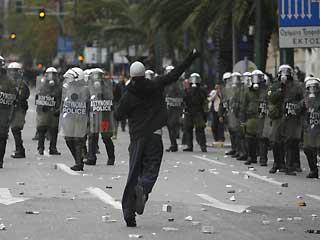by Sarantis Michalopoulos
Hundreds of thousands of Greeks are expected to take to the streets across the country and abroad today, accusing the centre-right government of covering up key details about a deadly 2023 train crash in central Greece that killed 57 people, mostly young people.
Recent polls show that seven out of ten Greeks believe that the ruling New Democracy government is shielding the politicians responsible for the tragedy. The government in Athens denies the accusations.
Yet a number of central questions surrounding the tragedy still remain unanswered, including whether the freight train involved was transporting illegal fuel that caused a massive explosion.
What happened
Eight days before the 28 February 2023 crash in Tempi, then-Transport Minister Kostas Karamanlis dismissed the opposition’s concerns over railway safety. “It’s embarrassing, and I’m ashamed, that you’re raising security issues," he said.
By 2 March, Karamanlis was out, resigning and taking “political responsibility."
Contrary to safety protocols, the crash site was cleared on 4 March, destroying critical evidence. The local prosecutor denied giving such an order, which could only have come from the government. The victims’ relatives accuse the government of staging a cover-up.
Several videos showed a huge explosion during the crash, raising suspicions that the freight train was transporting illegal flammable substances. No video footage was available at that time to show whether that was true.
The government dismisses the claims as conspiracy theories.
The New Democracy majority found no criminal responsibility for any politician after a parliamentary investigation committee set up by the government.
The slow progress of a justice ministry investigation has provoked outrage among the victims’ families. They formed the Victims’ Relatives Association, led by pediatrician Maria Karystianou, who lost her daughter in the accident.
An EU-funded contract
The European Commission “identified” the lack of a permanent, independent railway accident investigative body in Greece since 2019 as a violation of EU law. Yet, no action was taken against Athens.
Before the accident, EU Public Prosecutor Laura Kövesi had launched an investigation into an EU-funded contract signed in 2014 for the reconstruction and upgrade of the signalling system and remote control on Greek trains. Experts have suggested that the accident could have been avoided if these systems had been in place.
In March 2024, Kövesi said that Greek authorities were placing obstacles before her investigation.
Following her request, 23 non-political people were prosecuted. She also called for the prosecution of Transport Minister Karamanlis, but the immunity provided by the country’s constitution prevented it. Karamanlis was elected as an MP again last year.
Greek Prime Minister Kyriakos Mitsotakis attacked Kövesi, saying she had exceeded the limit of her competence.
Brussels connection
In August 2024, Euractiv exclusively reported that Greece had asked for the EU Transport portfolio in the new Commissions following elections two months earlier. Ursula von der Leyen ultimately granted Greece’s Apostolos Tzitzikostas the transport portfolio.
Before Tzitzikostas’ hearing in the EU House, Karystianou sent an email to von der Leyen – who has so far said nothing about the case - and EU Parliament chief Roberta Metsola warning that the Greek government has covered up for those responsible for the train crash. She never got a response.
In December, the European Commission launched an infringement procedure against the Greek government, requesting explanations for its continued failure to comply with railway safety standards. The procedure was signed by Tzitzikostas himself.
On 5 February, the EU left group asked for Tzitzikostas to appear in the plenary of the EU Parliament to discuss Greek train safety. At the conference of the political groups’ Presidents, the EPP, the EU Socialists, the far-right Patriots and Europe of Sovereign Nations rejected it.
A new request was again rejected.
On 7 February, the European Parliament passed a resolution expressing its concerns about Greece’s rule of law, citing the Tempi tragedy as an example. Meanwhile, the ad hoc Greek investigating body on Thursday confirmed that the train engines could not justify the explosion and did not rule out the existence of still unknown fuel.
DG MOVE on the spotlight
Referring to the recent Commission’s infringement procedure against the Greek government, Karystianou told Euractiv that the relatives’ association has been pushing since 2023 in the EU Parliament to get the Commission’s DG MOVE to look into possible EU violations in Greece’s rail networks.
She said the ad hoc investigating body inside Greece is not independent. “It is supervised by the transport ministry and its members are appointed by the minister without objective criteria, which affects its independence.” Karystianou said.
Commission had seen the ’shortcomings’
Asked by Euractiv whether the EU Commission currently guarantees the safety of Greek railways, EU spokesperson Anna-Kaisa Itkonen replied on Thursday that the executive was “actively addressing key shortcomings” in Greece’s railway system prior to the accident.
The Commission launched infringement proceedings against Greece in December 2021 for failing to establish a contractual agreement with OSE, its rail infrastructure manager, she said. That agreement was essential to ensure adequate and stable funding, along with performance incentives, she said.
“Greece did not put such an agreement in place, leading us to refer the case to the Court of Justice, which ultimately compelled Greece to act,” Itkonen said.
“We are now assessing whether the agreement between Greece and OSE meets the Directive’s requirements and adequately addresses all necessary aspects,” she added.
Tzitzikostas has made it clear that “safety continues to be one of the priorities of the Commission,” the spokesperson said.
The Commission also plans to propose a Delegated Act introducing an effective system for collecting and analysing safety-relevant data coming from accidents and incidents in the railway sector, Itkonen said.
“We need to ensure that in an increasingly harmonised Single European Railway Area, safety-relevant information is easily shared between authorities and companies across borders and that emerging risks are identified quickly and communicated without delay,” she said.
*first published in euractiv.com




 By: N. Peter Kramer
By: N. Peter Kramer

